Table of contents
Why drink saffron tea?
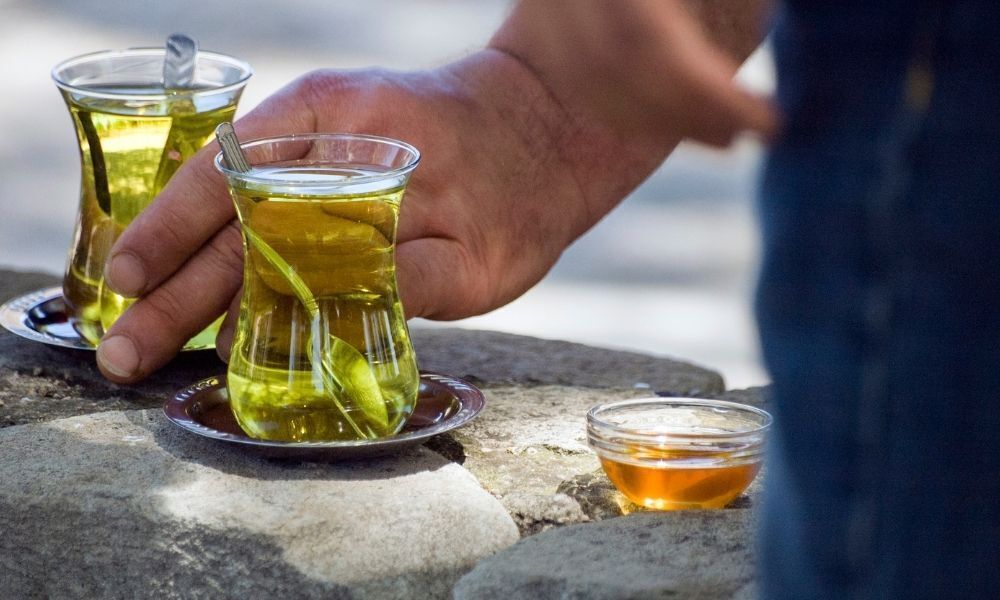
Turmeric, or turmeric, can be considered a cousin of ginger, since they belong to the same family. Its roots, widely used in cooking, have a very strong orange hue. For this reason, they have also been used as a dye for centuries.
Saffron tea has a beautiful and vibrant coloration, ranging from yellow to orange. In addition, this infusion has a strong, exotic and slightly spicy flavor. This is due to curcumin, a powerful anti-inflammatory active.
Thus, this drink has several medicinal properties, being rich in nutrients and minerals. Read on and check out all its health benefits!
More about saffron tea
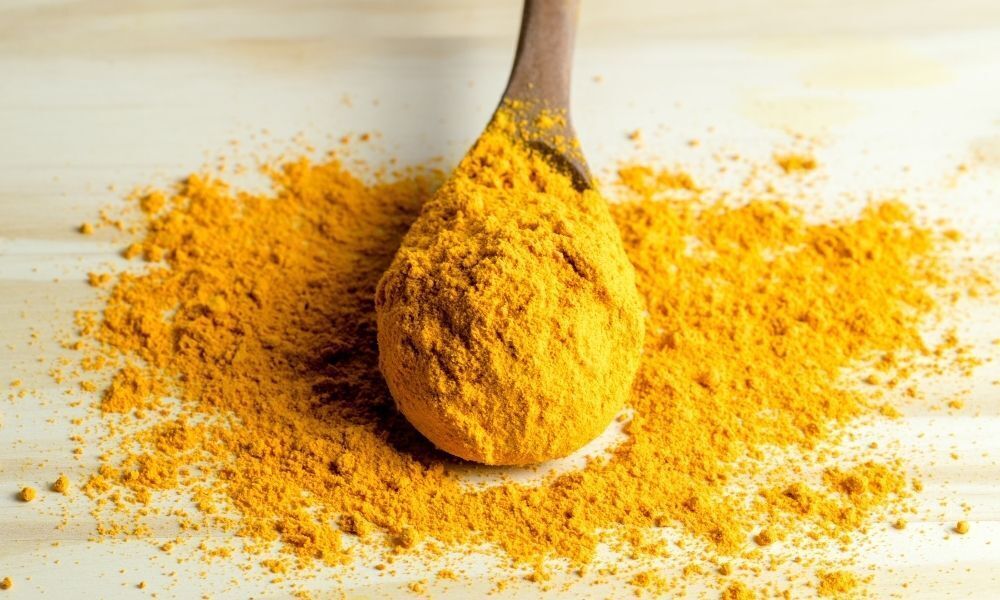
Saffron tea is widely used in India for its preventive and curative properties. It is able to act throughout the body, optimizing its functioning. Below, learn more about this powerful infusion!
Properties of saffron tea
Saffron tea has not been gaining popularity for nothing, since its properties are magnificent. It is a source of vitamins B3, B6 and C, besides being rich in minerals, such as calcium, iron, manganese, copper, zinc and potassium.
This drink has as its main active ingredient curcumin, responsible for the strong color and characteristic flavor. It is a flavonoid with the power to fight inflammation. Therefore, the tea is considered by many a natural anti-inflammatory.
In addition, it has antioxidant, diuretic and antispasmodic properties, helping to combat pain. Therefore, it can be used in the treatment of various diseases.
Origin of saffron
The scientific name turmeric, Curcuma longa, is also known as turmeric, turmeric, yellow ginger, turmeric and sun root. It is a plant native to the Asian continent, more specifically Indonesia and southern India.
It has a spicy aroma, with an exotic and slightly bitter taste, and is one of the essential ingredients of curry, a typically Indian spice. In addition, a curiosity is that in some countries in Asia, saffron is also part of the beauty routine. The powder of this root is diluted in water, and used to leave the skin lush and soft.
Side effects
Some side effects may occur after consuming saffron tea. Among them are: headache, dry mouth, changes in appetite, anxiety, dizziness, nausea, restlessness, drowsiness, sweating, vomiting, constipation, and diarrhea.
Also, consult a doctor before including this tea in your routine if you take antihypertensive medications. Curcumin, the active ingredient in saffron, can lower blood pressure too much when used in combination with medication. In fact, you should also be careful about overdosing. High doses of this plant (above 5 grams) can cause intoxication.
Contraindications
Despite having numerous health benefits, the consumption of saffron tea is not indicated for some people:
- Pregnant women: may cause abortion or stimulate labor;
- People with heart problems or low blood pressure: the tea lowers blood pressure;
- Individuals with gallstones and liver disease: a doctor should be consulted, as saffron may increase bile production;
- Those allergic to plants of the genus Olea: those allergic to olives usually suffer reactions when coming into contact with saffron as well.
Benefits of saffron tea
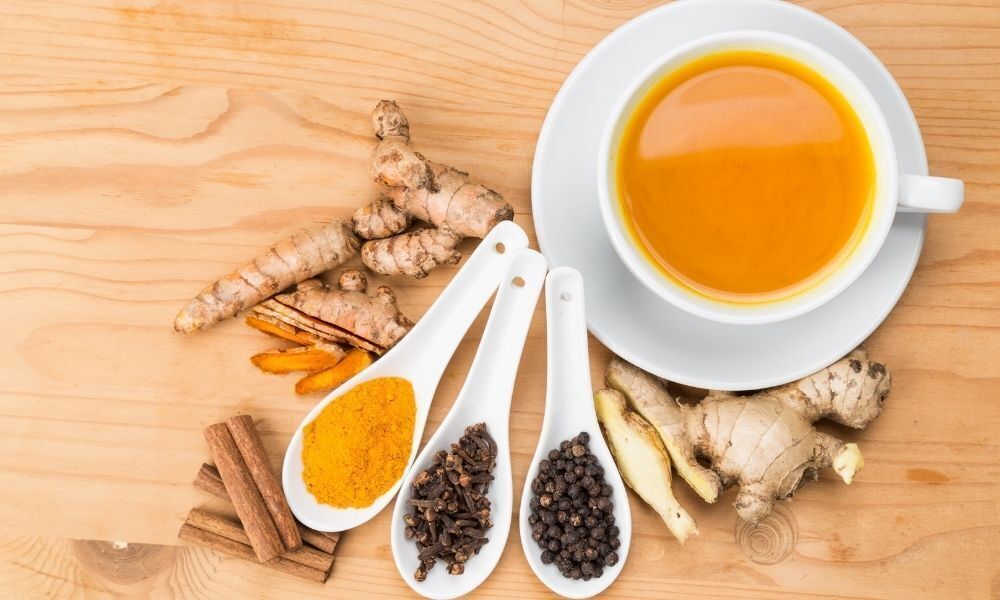
Knowing whether or not you can consume saffron tea, you need to know the benefits of this drink, which are numerous. Check out everything about the tea below!
Good for the heart
Turmeric tea helps reduce bad cholesterol. This was the conclusion of a study that showed that curcumin is capable of lowering cholesterol levels in general. This way, this drink also attenuates the risk of developing more serious problems, such as heart disease and stroke, popularly known as stroke.
This infusion acts on the blood circulation, helping to remove cholesterol plaques that stick to the vessels and arteries. This makes the process more fluid and efficient, contributing to the optimization of your body.
Helps to lose weight
For the body, saffron tea is an important ally in the weight loss process. To begin with, this infusion is low in calories, having only 8 calories in a cup. In addition, its main active ingredient, curcumin, helps in the digestion of food.
Thus, the metabolism as a whole is optimized, so when saffron tea is combined with a healthy diet, it contributes greatly to restricting the growth of fat cells in our body.
Moreover, this drink is able to balance blood sugar levels and increase the amount of serotonin in the brain, controlling appetite.
Good for the brain
Saffron tea is a friend of our brain and can be considered a powerful tranquilizer. In fact, regular consumption of this drink can decrease the occurrence of diseases such as depression, because it increases the production of the happiness hormone, serotonin.
In addition, the antioxidant properties of this infusion have the potential to prevent the brain damage that causes Alzheimer's and Parkinson's. This is because saffron tea works as a neuroprotector. It is worth noting that more studies are needed, but the results obtained to date are promising.
Increases immunity
An important benefit of saffron tea is its role in boosting immunity. Because of its golden nutritional value and antioxidant properties, a version of this tea is also known as golden milk.
Golden milk is an ancient drink, originating from India, more precisely from Ayurvedic medicine. It is also considered a variation of saffron tea, since it uses animal or vegetable milk instead of water. It is widely associated with good health, increased immunity and longevity.
Anti-inflammatory
Saffron tea has powerful anti-inflammatory action, being very useful to treat all inflammation in the body. Therefore, it is also a great ally of health, since it regulates the menstrual cycle. In addition, this drink helps to reduce the discomforts related to this period, such as cramps and back pain.
By the way, those who suffer from arthritis can also benefit from the properties of this infusion. This is because the curcumin present in turmeric is able to reduce the pain of these patients, being as effective as some medications to give a better quality of life.
Good for sight
Saffron tea is excellent for eye health, as it helps maintain good vision for much longer, protecting this organ and decreasing the possibility of suffering from future problems. In addition, two researches conducted in the UK suggest that curcumin, the main active ingredient in saffron, is able to treat glaucoma effectively, from the first signs.
Another study, still in its early stages, indicates that this root is also a great ally in the treatment of uveitis, a disease that causes inflammation of a part of the iris, the uvea (pigmented inner lining of the eyes).
Prevents cancer
The potential of saffron tea as an ally in the prevention and treatment of cancer has been constantly studied. Some research indicates that this root is able to slow down the growth of cancer cells.
Moreover, this action happens thanks to a chemical component, flavonoids, of this infusion: the crocin. It fights malignant cells, causing tumors to shrink.
However, more studies need to be finalized to ensure the effectiveness of this food against cancer. For now, what is known is that saffron tea is a powerful antioxidant and helps in the process of preventing various diseases of this kind.
Antioxidant
Saffron tea has a powerful antioxidant action. Studies conducted in the United States highlight that the properties of curcumin, the main active ingredient of this root, fight the free radicals that cause cancer and aging of cells.
Thus, this drink is able to prevent and reduce, in the medium and long term, the damage to our body. In addition, this tea helps in the absorption of nutrients and regulates the metabolism.
Fights flu and respiratory diseases
When ingested, saffron tea is a great ally in fighting colds, flu and respiratory diseases. The consumption of this drink helps the body to recover faster, since it is expectorant, that is, it cleans the airways and reduces inflammation.
Thus, those who have asthma should also consider the properties of this tea, since it relieves the symptoms of the disease. Incidentally, the benefits of the infusion of saffron can be enhanced when we add honey.
You probably know someone who recommends the use of honey to relieve flu symptoms. These people are right, because this food is a natural painkiller and antibiotic. Therefore, saffron tea with honey is a perfect combination.
Aphrodisiac
The saffron tea has enormous prestige as a natural aphrodisiac or sexual stimulant in Eastern countries. This happens because it helps to increase libido and also acts in the prevention of infertility.
One of the properties of this root is its vasodilating effect, which can promote increased sensitivity in the genital area. In addition, this infusion is a great option for men who suffer from premature ejaculation, since it helps reduce and even prevent these episodes.
Saffron tea
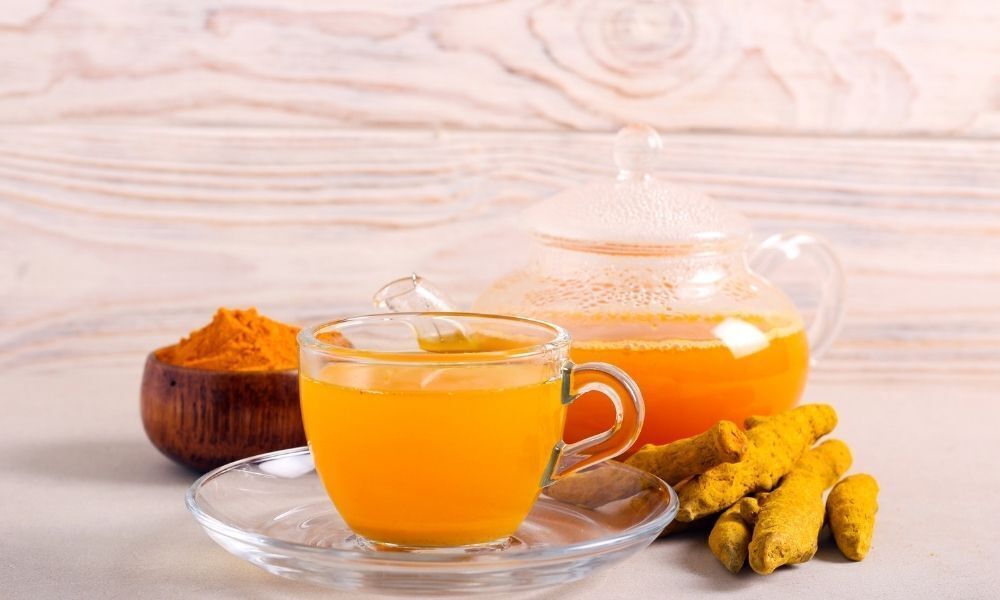
Besides being tasty, aromatic and visually appealing, saffron tea has numerous nutritional properties. Therefore, if you want to join the useful to the pleasant, or in this case, flavor and health, this drink is ideal. Check out the following indications and how to prepare!
Indications
Saffron tea (or turmeric) is one of the newest trends in the world of infusions. Despite having medicinal properties known for thousands of years in India, it has been slowly becoming popular in recent years in the West.
Among the benefits of this drink, its anti-inflammatory power stands out, an important characteristic in cold winter days, which have a higher incidence of flu and colds cases.
In addition, the infusion made with saffron is also indicated for individuals suffering from digestive problems, because this tea turbines the digestion of food and also helps eliminate toxins from the body.
Ingredients
For starters, know that there are two ways to prepare saffron tea. You can use the fresh root or powdered. Check out what you will need to prepare either version:
- 1 tablespoon grated saffron (already sanitized and peeled. Be careful with your fingers, they can become tinged) or 1 teaspoon saffron powder;
- 1 cup boiling water;
- Freshly ground black pepper to taste (optional).
Black pepper enhances the power of curcumin, making the benefits of saffron even more powerful.
How to do
To make your tea, cut a small piece of fresh saffron that has already been sanitized and peeled. Then, grate the saffron using gloves (to avoid yellow fingers). Put it aside in a dark-colored container. If you are using powder, just put it directly into the container in which the infusion will be made.
Place the water to boil. As soon as it boils, pour over the saffron and add the black pepper. Finally, cover the container and let it rest for about 15 minutes.
Saffron tea with rosemary
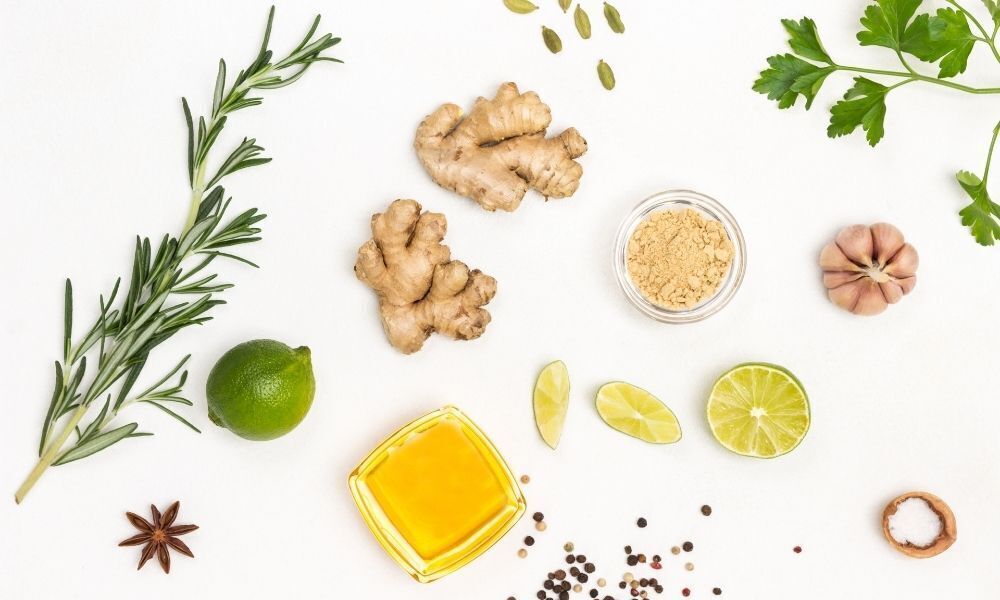
The saffron tea is just one of the ways to consume this root and can be increased with other foods, such as herbs and spices. The infusion of saffron with rosemary has a unique taste and an unforgettable aroma. Surely, your home will be wonderfully scented when making this drink. So, follow the step by step below!
Indications
When we go to the doctor, we are encouraged to eat foods of vibrant colors, since the colored part of the plants is associated with antioxidants. Therefore, saffron tea, which has an intense yellow color, is worth gold.
Many studies are analyzing the effectiveness of curcumin in fighting various diseases, as the population of some countries that consume saffron regularly has little or no prevalence of certain types of illness.
By the way, the combination of saffron tea with rosemary brings even more benefits, turbocharging its action on digestion. In addition, this herb helps relieve headaches.
Combating mental fatigue is one of the strong points of saffron tea with rosemary. It is an excellent option for the most stressful moments of our lives, such as school tests, job interviews or work meetings.
Ingredients
Check out the ingredients for a delicious and fragrant saffron tea with rosemary:
- 1 tablespoon grated fresh saffron (sanitized and peeled) or 1 teaspoon saffron powder;
- 1 cup boiling water;
- 1 tablespoon fresh rosemary.
How to do
To start your tea, put the grated or powdered saffron in a dark container, so it doesn't turn yellow (use gloves too, to protect your fingers when grating the root). Add the rosemary and set aside.
Then, bring the water to a boil and pour it over the rosemary and saffron mixture. Cover the container and let it rest for about 10 minutes. Then, just strain it and enjoy.
How often can I take saffron tea?
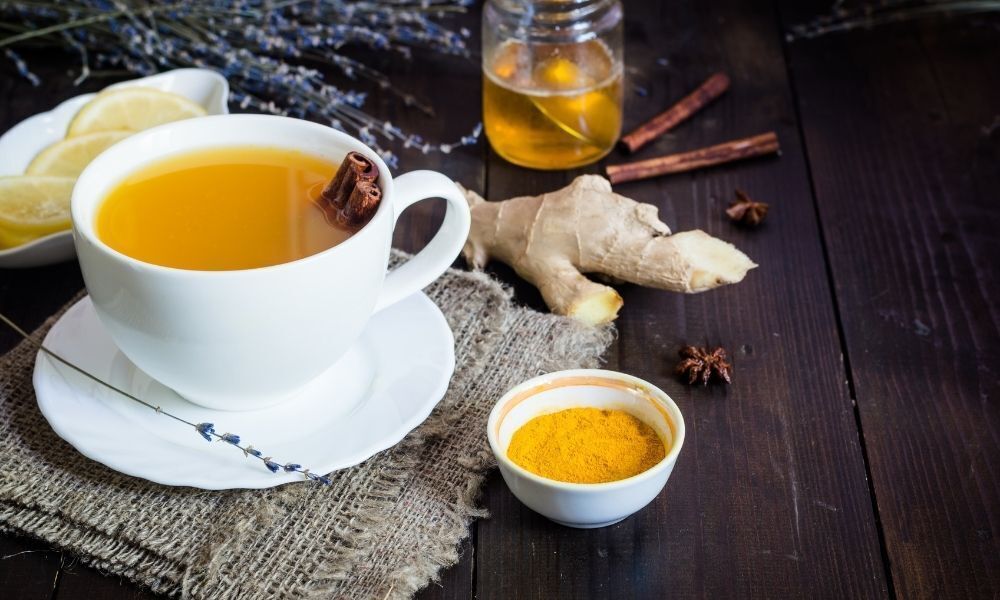
There is no established frequency to take saffron tea, but the ideal is not to exceed 1 cup of the drink per day. The infusion can be consumed on an empty stomach or after meals, to help in the digestion process.
However, to have more longevity, you can drink saffron tea daily, just like the residents of the island of Okinawa, Japan. This place has one of the highest life expectancies in the world.
But what to do if you do not like teas? A good strategy to include saffron in your diet is to use it to season salty foods or even give a special touch in cakes. In addition, remember that tea is a natural alternative treatment and does not exclude the evaluation of a qualified professional. If the symptoms persist or are more severe, do not hesitate to see a doctor.

